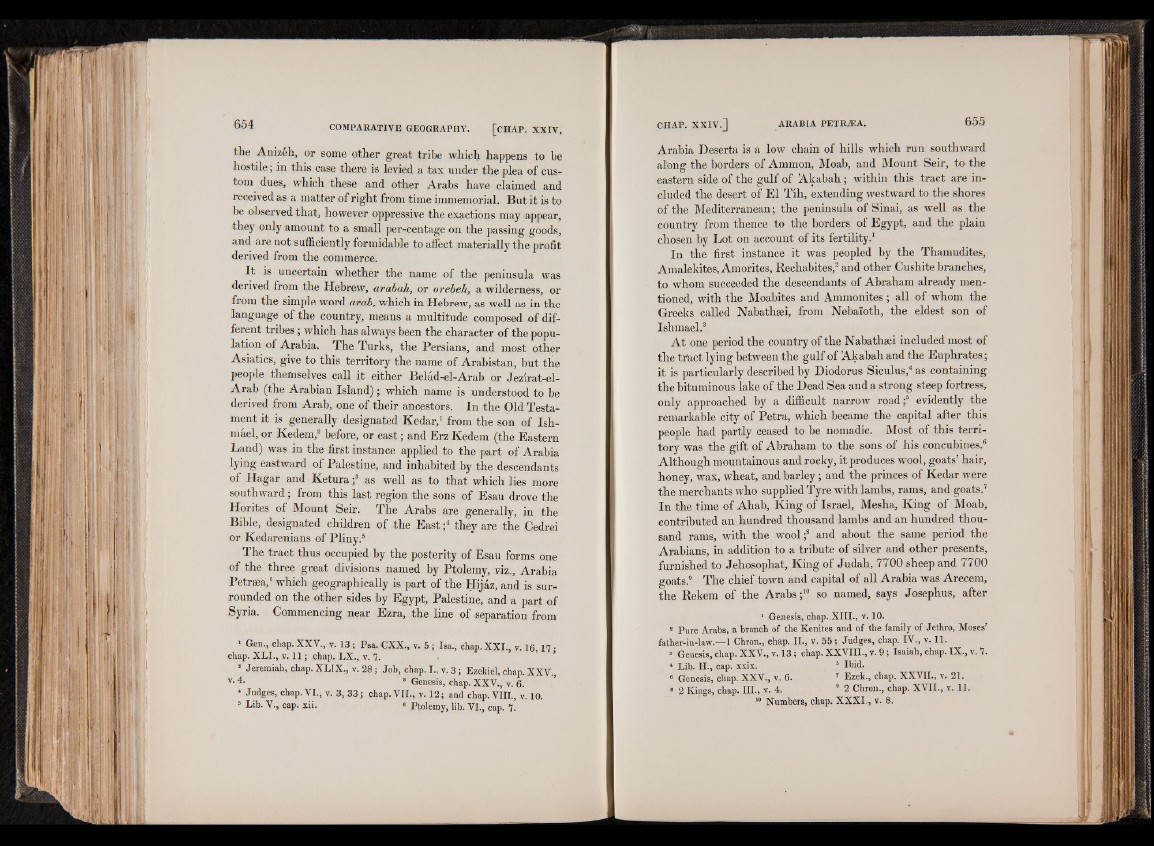
the Anizeh, or some other great tribe which happens to be
hostile; in this case there is levied a tax under the plea of custom
dues, which these and other Arabs have claimed and
received as a matter of right from time immemorial. But it is to
be observed that, however oppressive the exactions may appear,
they only amount to a small per-centage on the passing goods,
and are not sufficiently formidable to affect materially the profit
derived from the commerce.
It is uncertain whether the name of the peninsula was
derived from the Hebrew, arabah, or orebeh, a wilderness, or
from the simple word arab, which in Hebrew, as well as in the
language of the country, means a multitude composed of different
tribes; which has always been the character of the population
of Arabia. The Turks, the Persians, and most other
Asiatics, give to this territory the name of Arabistan, but the
people themselves call it either Belad-el-Arab or Jezirat-el-
Arab (the Arabian Island); which name is understood to be
derived from Arab, one of their ancestors. In the Old Testament
it is generally designated Kedar,1 from the son of Ish-
mael, or Kedem,2 before, or east; and Erz Kedem (the Eastern
Land) was in the first instance applied to the part of Arabia
lying eastward of Palestine, and inhabited by the descendants
of Hagar and Ketura f as well as to that which lies more
southward; from this last region the sons of Esau drove the
Horites of Mount Seir. The Arabs are generally, in the
Bible, designated children of the East ;4 they are the Cedrei
or Kedarenians of Pliny.5
The tract thus occupied by the posterity of Esau forms one
of the three great divisions named by Ptolemy, viz., Arabia
Petrsea,6 which geographically is part of the Hijaz, and is surrounded
on the other sides by Egypt, Palestine, and a part of
Syria. Commencing near Ezra, the line of separation from
1 Gen., chap. XXV., v. 13 ; Psa. CXX., v. 5 ; Isa., chap. XXI., v. 16 17 •
chap. XLI., v. 11 ; chap. LX., v. 7.
8 Jeremiah, chap. XL1X., v. 28; Job, chap. I., y. 3 ; Ezekiel, chap. XXV.,
v-4- 8 Genesis, chap. XXV., v. 6.
4 Judges, chap. VI., v. 3, 33 ; chap. V II., y. 12; and chap. VIII., y. 10.
5 Lib. V., cap. xii. I Ptolemy, lib. VI., cap. 7.
Arabia Deserta is a low chain of hills which run southward
along the borders of Ammon, Moab, and Mount Seir, to the
eastern side of the gulf of Akabah; within this tract are included
the desert of El Tih, extending westward to the shores
of the Mediterranean; the peninsula of Sinai, as well as the
country from thence to the borders of Egypt, and the plain
chosen by Lot on account of its fertility.1
In the first instance it was peopled by the Thamudites,
Amalekites, Amorites, Rechabites,2 and other Cushite branches,
to whom succeeded the descendants of Abraham already mentioned,
with the Moabites and Ammonites ; all of whom the
Greeks called Nabathsei, from Nebai'oth, the eldest son of
Ishmael.3
At one period the country of the Nabathsei included most of
the trtict lying between the gulf of Akabah and the Euphrates;
it is particularly described by Diodorus Siculus,4 as containing
the bituminous lake of the Dead Sea and a strong steep fortress,
only approached by a difficult narrow road;5 evidently the
remarkable city of Petra, which became the capital after this
people had partly ceased to be nomadic. Most of this territory
was the gift of Abraham to the sons of his concubines.6
Although mountainous and rocky, it produces wool, goats’ hair,
honey, wax, wheat, and barley; and the princes of Kedar were
the merchants who supplied Tyre with lambs, rams, and goats.7
In the time of Ahah, King of Israel, Mesha, King of Moab,
contributed an hundred thousand lambs and an hundred thousand
rams, with the wool;8 and about the same period the
Arabians, in addition to a tribute of silver and other presents,
furnished to Jehosophat, King of Judah, 7700 sheep and 7700
goats.9 The chief town and capital of all Arabia was Arecem,
the Rekem of the Arabs;10 so named, says Josephus, after
1 Genesis, chap..XIII., v. 10.
8 Pure Arabs, a branch of the Kenites and of the family of Jethro, Moses’
father-in-law.—1 Chron., chap. II., v. 55; Judges, chap. IV., y. 11.
3 Genesis, chap. XXV., v. 13; chap. XXVIII., v. 0 ; Isaiah, chap. IX., v. 7.
4 Lib. II., cap. xxix. 5 Ibid.
6 Genesis, chap. XXV., v. 6. 7 Ezek., chap. XXVII., y. 21.
8 2 Kings, chap. III., v. 4. 9 2 Chron., chap. XVII., y. 11.
10 Numbers, chap. XXXI., v. 8.